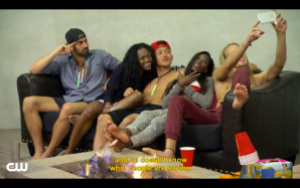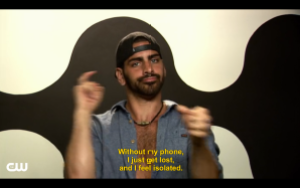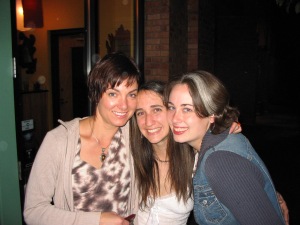
Deaf model Nyle DiMarco’s run on America’s Next Top Model has been a hot topic. Who doesn’t like a rugged hunk with baby blues and washboard abs? Especially one who has beensuch a brilliant ambassador of the deaf and hard of hearing community?
Unfortunately, being an ambassador has its pitfalls. Like being marginalized on national television.
In last week’s episode of ANTM, Devin took Nyle’s phone and consequently his primary means of accessing conversations. Nyle’s response sent a powerful message about what it feels like when one person’s ignorance cuts you off from other people.
He also gained widespread sympathy from viewers, which creates the perfect opportunity to open space for a honest discussion about the deaf experience in America.
Devin’s actions gave the public an insight into a pernicious attitude among hearing people that trivializes deaf people and our communication devices.
This attitude and resulting behaviors seriously impact deaf and hard of hearing people’s ability to integrate into and feel accepted in hearing communities, particularly in workplaces and social events.
Nyle is far from the only deaf person to experience this marginalization. He just happened to live it out on television, in front of millions. Hundreds of thousands of deaf people, myself included, deal with this in anonymity, every day.
Life in the Top Model House
While Nyle is on an upward curve in the competition and enjoys impressive popularity among viewers, both hearing and deaf, his life in the Top Model house hasn’t been so easy. Nyle only has an interpreter for competition-related events such as shoots and judges’ panel. In the house, his only access tool is a text-to-speech app on his smartphone.
 In last week’s episode, “The Girl Who Got All Dolled Up,” during Devin’s birthday party, Devin takes Nyle’s phone and goes on a selfie spree. For more than 20 minutes, Nyle sits there, isolated and completely excluded from his peers’ conversation (not that he’s missing much, but that’s beside the point).
In last week’s episode, “The Girl Who Got All Dolled Up,” during Devin’s birthday party, Devin takes Nyle’s phone and goes on a selfie spree. For more than 20 minutes, Nyle sits there, isolated and completely excluded from his peers’ conversation (not that he’s missing much, but that’s beside the point).
This is particularly hurtful, considering the previous week’s episode featured Nyle and his friend Brittany investing time and energy into teaching the other models sign language and exposing them to what it feels like to be deprived of your primary means of communication. Nyle even led the models in signing “Happy Birthday” to Devin just before Devin took his smartphone.
“You’re taking away my phone for your own entertainment and you’re not even talking with me? I felt like I was invisible so I just walked out.” – Nyle DiMarco
 Only when does Nyle give up and walk out do some of the models realize what they’ve done, and a few of them have the decency to apologize to him. However, Devin gets defensive.
Only when does Nyle give up and walk out do some of the models realize what they’ve done, and a few of them have the decency to apologize to him. However, Devin gets defensive.
Lacey, Courtney, and Mame, on the other hand, get it. The first two recognize that without his phone, Nyle is cut off. And Mame points out that Nyle has value: “He’s very smart and he does have a lot to contribute to our conversations, but it’s hard when no one’s including him.”
Solo in Steamboat
This episode hit close to home for me, since I’ve been through this. Many times.
After I graduated from KU, I moved to Steamboat Springs, Colorado, for my first newspaper job. I figured it would be good for personal growth to immerse myself in an all-hearing environment, three hours away from the closest deaf community. I would learn to integrate and advance my career, and I’d try harder to make hearing friends. This was before smartphones and voice-to-text apps.
The staff was composed primarily of 20-somethings who liked to drink, party, and sleep with each other. My being in a committed relationship wasn’t the only thing that set me apart.
My deafness and the lack of sign language gave me the sensation of being on the outside looking in, getting snippets of information here and there when people thought to include me. Sure, I’d grown up in the mainstream and went to a hearing university, but I’d always been provided with interpreters. Once I finished school, that was it. I was on my own. I only used sign language every few months, when I visited my hometown.
 At first, I tried. I stockpiled reporter notebooks and pens and accepted invitations to go bar-hopping. I tried to talk with my coworkers and got hit on by rodeo cowboys (note: they don’t take rejection well and can’t write for shit when they’re plastered).
At first, I tried. I stockpiled reporter notebooks and pens and accepted invitations to go bar-hopping. I tried to talk with my coworkers and got hit on by rodeo cowboys (note: they don’t take rejection well and can’t write for shit when they’re plastered).
But I noticed a pattern – when I met new people, half the time they viewed my notepad as the most awesome, cool  thing in the world and took it and started scribbling to each other as though they were reliving their middle school gossip journals.
thing in the world and took it and started scribbling to each other as though they were reliving their middle school gossip journals.
I often wound up pulling out my backup pen and resorting to square bar napkins.
I stopped going out so often and focused on my coworkers. I was rooming with two of them, and our house was the go-to place.
At our parties, we went through stacks of notepads, but that was starting to get old. During one party, I tried to introduce my coworkers to video relay services.
I was excited about the possibility that we’d have a new way to communicate outside work, where my only tool was the instant messaging system on our computers, and without pen and paper or laptops.
We all gathered on the couch and I turned on the TV, sent my then-boyfriend to another room, and called him through the VRS. I had just begun signing when the interpreter looked past me, screwed up her face, and snapped at me, “This is entirely inappropriate. I have to disconnect now.” And she hung up.
I was at an absolute loss. I turned around and found my coworkers falling over themselves in hysterical laughter. One of them confessed to me that a male reporter had mooned the interpreter.
That was the first and last time I demonstrated VRS to hearing peers. I was horrified and humiliated. I was hurt that nobody apologized or recognized the significance of my reaching out to them. Nobody asked for my phone number. I didn’t want to make ripples, so I shrugged it off and got another beer. Like Nyle said, “I keep trying to communicate with them but I’m just tired of hinting and telling them. Do you think I need to stop the whole party and say, ‘Please communicate with me’? No, that’s not something I’m going to do.”
“I keep trying to communicate with them but I’m just tired of hinting and telling them. Do you think I need to stop the whole party and say, ‘Please communicate with me’? No, that’s not something I’m going to do.” – Nyle DiMarco
 I threw in the towel, moved out to a ranch in the country, and spent my free time snowboarding, ranch-sitting, and training horses until I left for graduate school a year later.
I threw in the towel, moved out to a ranch in the country, and spent my free time snowboarding, ranch-sitting, and training horses until I left for graduate school a year later.
The VRS incident profoundly affected me, and I shut out my classmates at American University. I didn’t go out with them. I didn’t offer pen and paper. I barely even talked with them during and after classes. I didn’t tell them about VRS.
It took a long time for me to warm up to them, and only by my second year did I become friends with some of them, and only through Facebook. It’s still something I regret to this day, because they are wonderful, intelligent, fun people and I missed out on opportunities to discuss topics I loved with peers. However, I still haven’t shared VRS with any hearing friends.
Years later, after I married Seth, we decided to give Steamboat another try. I figured it would be better since I was no longer alone.
It wasn’t.
This time, I didn’t stumble in my social life, but in the workplace. I returned to the Steamboat newspaper, telling myself I’d be thicker skinned and more assertive. I suggested VRS for our weekly staff meetings. I could stay at my desk and call in to the conference room. My suggestion was denied. The editor told me she wanted everyone there in person. My presence was more important than ensuring I had full access.
We bought Dragon Diction voice-to-text software, which failed miserably and produced gibberish. Then we resorted to a coworker typing summaries on a laptop. One day, everybody forgot about the laptop and I didn’t know where it was. I sat there for the first 15 minutes of the meeting before I finally got up and walked out, tears of frustration in my eyes. I was drained.
Between that, a local surgeon turning me away because he “didn’t have the time” to communicate with me using a laptop, and the local hospital dragging its heels on setting up VRI … I was done. We left Steamboat and I took a job at Gallaudet, where I finally had complete access in the workplace and a full social life.
But even as I notched a significant career advancement, I felt like a failure. I had failed to “make it” in the hearing world, job-wise and socially.
I constantly ask myself: Why should I feel this way, when it was hearing people who failed to understand the role of technology in my communication needs and the value I had to offer, if only they would get it? If only they would respect and embrace that technology rather than view it as a cool novelty and not a necessity. This attitude has impacted my life so much, beyond simple, day-to-day conversations.
Playing with Deaf Dolls
Because of all these incidents, I completely identify with Nyle. It’s frustrating and draining and humiliating and degrading.
 It is appropriate that the main photo shoot in this episode was about dolls. The models posed like dolls, in a box with accessories. Nyle did particularly well, taking second place.
It is appropriate that the main photo shoot in this episode was about dolls. The models posed like dolls, in a box with accessories. Nyle did particularly well, taking second place.
You see, the hearing world often treats us like dolls. At first, we are neat new toys with awesome accessories and they have fun playing with us and/or our accessories until the novelty wears off. Then they put us on the shelf. Sometimes because they’re no longer interested, or they don’t have the time for us. Sometimes because we’re just a token. Employers like us to “complete” their collection, to represent diversity, but without providing us the full access we need. “Here, look, we have the disability doll sitting there on our shelf!”
All the while, their exuberance, combined with ignorance, deprives us of a two-way connection and the ability to feel included and equal. We’re dumped out of our boxes and left on the floor while our communication tools are taken away and played with.
As Nyle said, “Without my phone, I just get lost, and I feel isolated. And I try to teach them sign language, but I feel there’s nothing coming back in return. I know this is a competition, but I’m human.”
“I try to teach them sign language, but I feel there’s nothing coming back in return. I know this is a competition, but I’m human.” – Nyle DiMarco
This is what we need to be talking about. We are human, and we deserve respect. We don’t deserve to be played with.
A Call to Action
Hearing people watching the show were exposed to one example of the treatment so many of us experience. Nyle’s popularity with these viewers has generated sympathy. One column, for example, calls out Tyra for failing to stick up for him.
Nyle has also shown extreme courage and dignity throughout the show, especially in the last two episodes, and he has served as an excellent ambassador of the Deaf community to a predominantly hearing viewership.
Why aren’t we using that momentum to encourage hearing people to realize that Nyle’s experience is not restricted to the Top Model house, but is the experience of hundreds of thousands of deaf people?
Some stories are easy to identify as examples of inappropriate, over-the-top behavior. Such as the one about a hearing man who called VRS 4,600 times to masturbate and theRepublican lawmaker who called people with disabilities a “drain on society.”
What hearing people seem to struggle with is understanding how small, seemingly insignificant actions done “just in fun” can leave deep scars that take years to fully heal and that can often fundamentally change how the impacted deaf person views and interacts with all hearing people afterward.
Over the past few days, people in the deaf community have been focusing primarily onone individual’s comments denigrating Nyle – comments that have absolutely no connection to the events on the show. While it is important to discuss internal bullying and exercise community accountability, we need to be thinking about how we as a community can use the momentum from widespread sympathy for Nyle to encourage more thoughtfulness among hearing people about how they treat deaf people on a daily basis.
Right now, we are completely missing the boat. Now is when we have the prime opportunity to take advantage of Nyle’s popularity and connection with hearing viewers, engage them and other hearing people through mainstream and social media, and educate them that Nyle is far from alone in his experience of exclusion. We need to urge them to understand that their actions, even as simple as taking away a phone or dismissing a communication tool as unnecessary, are more damaging than they realize.
Let’s harness our anger and work not only within our community, but also outside of it. Let’s capitalize on this opportunity to change the world for the better. And let’s not allow this moment to pass us by and the baring of Nyle’s painful experiences to the public go to waste.
*My deepest gratitude to my beta readers, who provided excellent feedback and helped me guide this post in a better direction. You know who you are.
You can read Tara’s original post here: http://jayhawkeditor.com/2015/09/30/a-model-of-marginalization/
Tara Schupner Congdon is an avid reader and writer who spends her free time riding horses and shooting off her mouth about politics and current events. She grew up profoundly deaf and mainstream in the midwestern United States. Tara graduated from the University of Kansas School of Journalism and worked in the media industry for 10 years before joining the Gallaudet University Office of Development, in Washington, D.C. She also enjoys writing about disability and accessibility issues with the hope of increasing awareness among the general public.
The Limping Chicken is the UK’s deaf blogs and news website, and is the world’s most popular deaf blog.
Find out how to write for us by clicking here, or sign a blog for us by clicking here!
Make sure you never miss a post by finding out how to follow us, and don’t forget to check out what our supporters provide:
- Phonak: innovative technology and products in hearing acoustics
- Ai-Live: Live captions and transcripts
- Bellman: hearing loss solutions
- Deaf Umbrella: sign language interpreting and communications support
- Clarion: BSL/English interpreting and employment services
- Appa: Communication services for Deaf, Deafblind and hard of hearing people
- SignVideo: Instant BSL video interpreting online
- 121 Captions: captioning and speech-to-text services
- Doncaster School for the Deaf: education for Deaf children
- Signworld: online BSL learning and teaching materials
- deafPLUS: Money advice line in BSL
- Hamilton Lodge School in Brighton: education for Deaf children
- Lipspeaker UK: specialist lipspeaking support
- RAD: financial advice for Deaf people
- Krazy Kat: visual theatre with BSL
- Exeter Deaf Academy: education for Deaf children
- SignHealth: healthcare charity for Deaf people
- CJ Interpreting: communication support in BSL
- Sign Solutions:, language and learning
- Sign Lingual: BSL interpreting and communication services
- Action Deafness Communications: sign language and Red Dot online video interpreting
- SDHH: Project Development and Consultancy
- Mykasoft: Deaf-run Web Design Studio





















Sybil
October 7, 2015
Brilliant. Thank you for sharing your story. People can be idiots. Particularly once they reach management level- isn’t that the Dilbert principle?
I’m in the middle of leaving a job right now because of similar issues. I’m not sure why some hearing people just don’t get that (especially in a professional setting,) we have the RIGHT to the same information that our hearing coworkers receive. How can we be productive individuals if we have to struggle and fight just to get part of the information everyone else does?
I wish you loads of success in everything! Thank you!
Lisa
October 15, 2015
I work in a all hearing environment shooting celebrities for a living and I am the ONLY Deaf Female Photographer in the media. I survived in the busy streets in NYC doing celebrity coverage and navigate with publicist in getting to my call time ready for red carpet shoots. It does have it’s challenges but I have learned to roll in with the competitive world in media field.
I learned to be aggressive with my peers and let them know my stance and that i can work in the environment that deafness should not stop me. Nyle is not alone experiencing it by being a public figure. Thank you for sharing this article.
Hartmut
October 19, 2015
An appeal to provide full accessibility for deaf persons in this highly competitive, cut-throat environment seemed not to have worked well for the most talented deaf individual. It requires for the powers-to-be in the modelling industry to take extra consideration for the basic needs of deaf model aspirants to be able to work in it. There were deaf female models, trained and with every attributes, who competed in national Miss pageants and won high placements.
One has to examine if it is realistic to compete solely in the hearing environment without explicitly telling them they have to provide communicative accommodations to deaf aspirants.
Hartmut
October 19, 2015
I need to add about the deaf female models who won high placements in national Miss Pageants: They were not successful in obtaining modelling jobs beyond few shots in magazines.